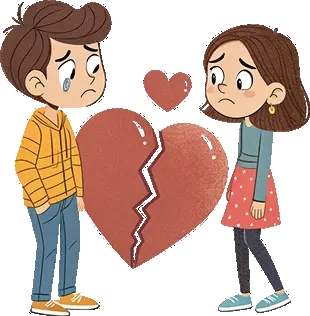Why Does Heartbreak Hurt So Much, and How Can You Cope?
Heartbreak is one of the most intense emotional experiences a person can go through. The pain of losing someone you deeply care about can feel overwhelming.

Heartbreak is one of the most intense emotional experiences a person can go through. The pain of losing someone you deeply care about can feel overwhelming, almost as if a part of you is missing. But why does heartbreak hurt so much?
When a relationship ends, your brain reacts similarly to physical pain. Studies show that the brain releases stress hormones like cortisol and adrenaline, triggering feelings of anxiety, sadness, and even physical discomfort. The emotional attachment you formed with your partner is suddenly severed, leaving your mind and body struggling to adjust.
How Does the Brain React to Heartbreak?
The brain plays a crucial role in why heartbreak feels unbearable. When you're in love, your brain releases dopamine, a neurotransmitter associated with pleasure and reward. This is why being in love feels euphoric. However, when a breakup happens, dopamine levels drop drastically, leading to withdrawal-like symptoms. In fact, brain scans have shown that heartbreak activates the same areas as physical pain, explaining why it feels so agonizing.
What Are the Emotional Stages of Heartbreak?
Understanding the emotional stages of heartbreak can help you navigate the healing process. These stages include:
- Shock and Denial – Initially, you might struggle to accept the breakup, feeling numb or in disbelief.
- Pain and Guilt – As reality sets in, emotional pain intensifies. You might blame yourself or question what went wrong.
- Anger and Bargaining – Frustration and resentment arise, sometimes leading to desperate attempts to mend the relationship.
- Depression and Loneliness – Sadness becomes profound, and feelings of emptiness take over.
- Acceptance and Moving Forward – Eventually, you come to terms with the breakup and begin to heal.
How Can an Emotional Healing Coach Help Overcome Heartbreak?
Overcoming heartbreak requires time, patience, and support. Many people find it helpful to work with an emotional healing coach who specializes in guiding individuals through difficult emotional transitions. These professionals help you understand your feelings, process the breakup in a healthy way, and develop strategies to rebuild your confidence and self-worth.
An emotional healing coach provides personalized support, helping you reframe negative thoughts, set boundaries, and rediscover your inner strength. Their expertise in emotional resilience makes the journey to healing much smoother and less overwhelming.
What Are Effective Strategies for Overcoming Heartbreak?
If you’re struggling with heartbreak, here are some effective ways to cope and start your healing journey:
1. Allow Yourself to Feel
Suppressing your emotions can make heartbreak linger longer. Give yourself permission to grieve the loss, cry if needed, and express your feelings in a healthy way. Journaling or talking to a trusted friend can help process emotions constructively.
2. Avoid Contact with Your Ex (At Least Initially)
It’s tempting to reach out to your ex, but maintaining contact can prolong the healing process. Cutting off communication allows your heart and mind to detach, helping you regain emotional independence.
3. Focus on Self-Care
Self-care plays a significant role in overcoming heartbreak. Engage in activities that promote well-being, such as exercising, eating healthy, meditating, or practicing mindfulness. Prioritizing your mental and physical health helps restore balance in your life.
4. Seek Support
Surrounding yourself with supportive friends and family can ease the burden of heartbreak. Talking to someone who listens without judgment can be incredibly therapeutic.
5. Rediscover Your Passions
After a breakup, it’s easy to lose sight of who you are outside the relationship. Use this time to reconnect with hobbies, set new goals, and explore activities that bring joy and fulfillment.
6. Work with an Emotional Healing Coach
An emotional healing coach provides valuable guidance, helping you break free from emotional distress and move forward with confidence. Their expertise in emotional well-being can equip you with tools to rebuild your self-esteem and create a positive mindset.
7. Practice Mindfulness and Meditation
Mindfulness techniques, such as meditation and deep breathing, help calm the mind and reduce emotional turmoil. These practices allow you to stay present and prevent negative thoughts from overwhelming you.
8. Reframe Your Perspective
Instead of viewing the breakup as a failure, see it as an opportunity for growth. Every relationship teaches valuable lessons that contribute to personal development. Focus on what you’ve learned rather than what you’ve lost.
How Long Does It Take to Overcome Heartbreak?
There is no set timeline for overcoming heartbreak. Healing varies from person to person, depending on the depth of the relationship, personal coping mechanisms, and emotional support. Some people recover within months, while others may take longer. The key is to be patient with yourself and trust that time, along with proactive healing efforts, will ease the pain.
What Are the Signs That You’re Healing?
As you move through the stages of heartbreak, you may notice positive changes indicating emotional recovery:
- You think about your ex less frequently.
- Your emotions feel more stable and manageable.
- You start enjoying life and engaging in activities again.
- You feel hopeful about the future and open to new experiences.
Can Heartbreak Make You Stronger?
Absolutely! Heartbreak, while painful, can lead to profound personal growth. Many people come out of a breakup stronger, wiser, and more self-aware. Through the healing process, you learn to establish boundaries, prioritize self-love, and build emotional resilience.
Final Thoughts
Overcoming heartbreak takes time, but with the right approach, healing is possible. By allowing yourself to feel, practicing self-care, seeking support, and working with an emotional healing coach, you can navigate the journey to emotional recovery successfully. Remember, heartbreak is not the end—it’s a new beginning filled with opportunities for self-discovery and personal growth.
What's Your Reaction?
















.jpg)
.jpg)

